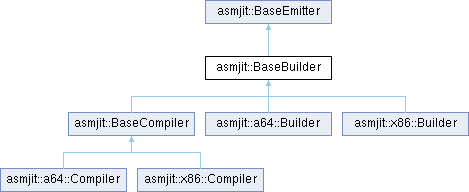asmjit::BaseBuilder Class Reference [¶]

Builder interface.
BaseBuilder interface was designed to be used as a BaseAssembler replacement in case pre-processing or post-processing of the generated code is required. The code can be modified during or after code generation. Pre processing or post processing can be done manually or through a Pass object. BaseBuilder stores the emitted code as a double-linked list of nodes, which allows O(1) insertion and removal during processing.
Check out architecture specific builders for more details and examples:
- x86::Builder - X86/X64 builder implementation.
- a64::Builder - AArch64 builder implementation.
